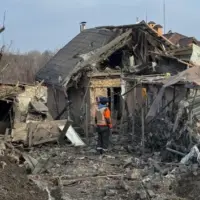
 iStock/Thinkstock(WASHINGTON) — With three weeks until the Obama administration leaves office, Secretary of State John Kerry defended the U.S. decision to abstain from last week’s United Nations vote that condemned Israeli settlements.
iStock/Thinkstock(WASHINGTON) — With three weeks until the Obama administration leaves office, Secretary of State John Kerry defended the U.S. decision to abstain from last week’s United Nations vote that condemned Israeli settlements.
Kerry argued that the settlements threatened the viability of a future two-state solution that could bring peace between Israelis and Palestinians.
“The vote in the United Nations was about preserving the two-state solution. That’s what we were standing up for, Israel’s future as a Jewish and democratic state,” Kerry said in a speech at the State Department on Wednesday.
He defended the friendship between Israel and the U.S., while at the same time harshly criticizing Israel’s expansion of settlements in the occupied territories.
“If more and more settlers are moving in to the middle of Palestinian areas it’s going to be that much harder to separate,” Kerry said, adding, “No one thinking seriously about peace can ignore the reality of what the settlements pose to that peace.”
While the Israeli settlement issue would be just one piece of a two-state solution framework, the current administration views it as a critical obstacle to peace. ABC News breaks down below what you need to know about Israeli settlements:
What are Israeli settlements?
Israeli settlements are communities of Israeli citizens, often ethnically Jewish, that are located within the Palestinian territories of the West Bank, East Jerusalem and the Golan Heights. They range from small outposts and villages to cities with tens of thousands of residents.
The territories have been occupied by Israel since the 1967 Six-Day War — when Israel, feeling that its security was threatened by Arab neighbors, captured these areas along with the Gaza Strip and the Sinai Peninsula from Egypt, Jordan and Syria. (The border between Israel and the West Bank is often referred to as the “1967 line” and is viewed as a possible border between Israel and a future Palestinian state if the parties pursue a two-state solution.)
Originally, Israeli settlements were located in all of these areas, but Israel evacuated the settlements from the Sinai Peninsula in 1979 following a peace agreement with Egypt and from the Gaza Strip in 2005 following a proposal by then-Israeli Prime Minister Ariel Sharon that was meant to forward the Israeli-Palestinian peace process.
According to Kerry, there are 130 Israeli settlements east of the 1967 line. One hundred thousand settlers have moved into occupied territory since 2009.
Nearly 90,000 settlers live east of the separation barrier, a wall built by Israel due to security concerns during the Second Intifada starting in 2000.
At the end of 2015, the Israeli Interior Ministry said nearly 400,000 Jews live in the West Bank, including those beyond the separation barrier. (In comparison, about 2.75 million Palestinians live under Israeli military occupation in those areas.)
It is estimated that more than 300,000 Jews live in East Jerusalem, which contains some of the holiest sites for Christians, Jews and Muslims. Israel occupied that territory after the 1967 war.
On Monday, despite the U.N.’s vote, Israel announced that it would install 5,600 new homes in East Jerusalem.
Why do Israeli settlements cause controversy?
Israelis advocate for and defend settlement construction for various historical and religious connections, as well as political and security reasons.
But the United Nations considers Israeli settlements illegal under international law, in part because they violate several U.N. Security Council resolutions.
Israel argues that settlements are legal because the 1949 Fourth Geneva Convention, which defines humanitarian protections for civilians in war zones and which Israel signed, does not apply to the territories occupied in the 1967 war. However, most international institutions like the U.N. Security Council, U.N. General Assembly, and International Court of Justice, say the Fourth Geneva Convention applies to Israel’s circumstance.
The U.S., Israel’s oldest and strongest ally, sees the settlements as an impediment to a two-state solution, only rejecting some as illegal under Israeli law, according to the State Department. For this reason, the Obama administration has routinely “strongly condemned” Israeli plans to build a new settlements.
Last week, the U.S. abstained from a U.N. vote condemning Israeli settlements. (Traditionally, the U.S. has vetoed U.N. resolutions that condemned settlements.)
In Wednesday’s speech, Kerry defended the U.S. decision, saying that, “In the end, we could not in good conscience protect the most extreme elements of the settler movement as it tries to destroy the two-state solution. We could not in good conscience turn a blind eye to Palestinian actions that fan hatred and violence.”
Kerry called the two-state solution “the only way to achieve a just and lasting peace between Israelis and Palestinians.” In the speech, he provided framework for a resolution that would establish international borders between Israel and Palestine based on territorial lines drawn in 1967.
“It is a policy of permanent settlement construction that risks making peace impossible,” he said.
Kerry rejected that a two-state solution would negatively affect Israeli security, though many Israelis argue that a sovereign Palestinian state on its border could prove hostile.
How does the Trump administration view settlements?
A Trump administration could mark a sharp change in U.S. policy toward Israeli settlements.
In an interview with Israel’s Army Radio, Jason Greenblatt, co-chairman of the Trump campaign’s Israel Advisory Committee, said, “It is certainly not Mr. Trump’s view that settlement activities should be condemned and that it is an obstacle for peace, because it is not an obstacle for peace.”
Trump’s pick for Ambassador to Israel, David Friedman, is the president of the American Friends of Bet El Institutions, associated with the Jewish settlement of Bet El. Friedman has consistently and actively supported the construction of new settlements.
“I think the West Bank was captured from Jordan in a defensive war,” he told ABC News at an October Trump rally in Israel, referencing the 1967 war. “The Jordanians haven’t sought to repatriate that land so I think; I’m a lawyer, under international law I don’t think these settlements are illegal.”
He has also been pessimistic about the idea of a two-state solution.
“A two-state solution between Israel and the Palestinians appears impossible as long as the Palestinians are unwilling to renounce violence against Israel or recognize Israel’s right to exist as a Jewish state,” Friedman wrote in a post for Medium, along with Greenblatt.
“The U.S. cannot support the creation of a new state where terrorism is financially incentivized, terrorists are celebrated by political parties and government institutions, and the corrupt diversion of foreign aid is rampant,” the pair added. “The U.S. should not support the creation of a state that forbids the presence of Christian or Jewish citizens, or that discriminates against people on the basis of religion.”
Friedman believes that the United States doesn’t necessarily have to pursue that solution, but America should support Israel’s decision.
“He’s not going to adopt the view that George Bush took in 2004, that it’s an American imperative for there to be a two-state solution. It’s not,” Friedman has said.
Trump has said he would veto any resolution aimed at an agreement between Israel and Palestine proposed by the United Nations Security Council and said the entire U.N. is “not a friend of democracy” and “surely is not a friend to Israel.”
But that doesn’t mean a U.S.-brokered agreement is off the table. Trump has called the Israeli-Palestinian solution “the ultimate deal.”
“As a deal-maker, I’d like to do … the deal that can’t be made. And do it for humanity’s sake,” Trump told the Wall Street Journal.
On Wednesday, Trump tweeted before Kerry’s speech, asking Israel to “stay strong” until his inauguration.
Copyright © 2016, ABC Radio. All rights reserved.












